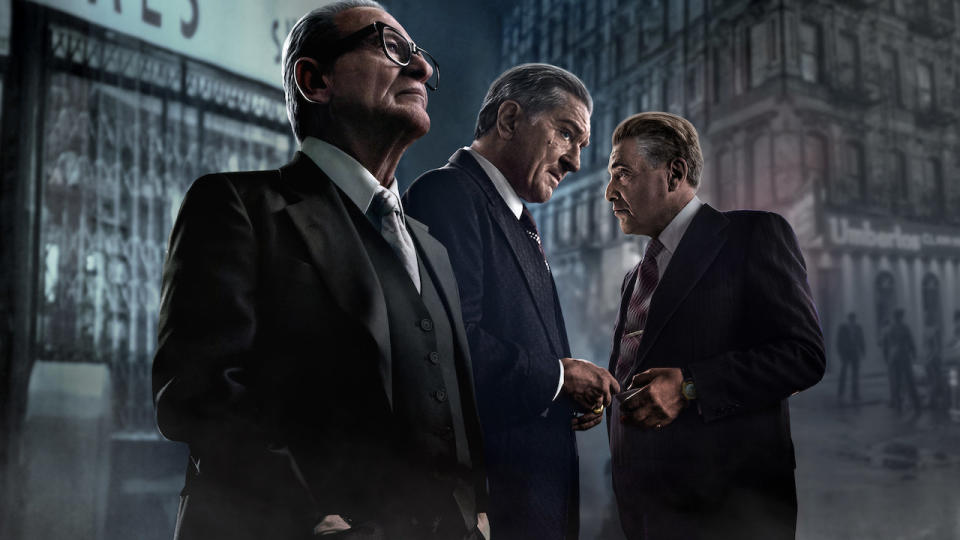Netflix Movies in Theaters First: Here’s Why Ted Sarandos May Go Back to the Future

- Oops!Something went wrong.Please try again later.
Hollywood loves stories that capture the imagination and this would be a great one: Netflix, the number-one streamer and exhibition nemesis, falls on hard times in the face of declining subscriptions. What could possibly save it? Only the theaters, the old-fashioned brick-and-mortar outlets that provide word of mouth and real-time revenue thanks to people who pay good money to gather, buy popcorn, and sit in the dark.
That narrative emerged from CinemaCon in April, which took place days after Netflix announced its disastrous Q1 2022 results and the stock took a plunge from which it has yet to recover. In between theater owners trading verses of “Ding dong the witch is dead,” National Association of Theater Owners NATO president and CEO John Fithian gave his State of the Industry address.
More from IndieWire
Netflix Buying Roku? Tech World Loves the Idea, Wall Street Says It's Looney Tunes
Netflix Launches Game Based on 'Queen's Gambit' -- No, Not Actual Chess
“I represent the movie-theater owners, but Netflix? We love those guys,” he said. “[Netflix CEO] Ted Sarandos knows movies and TV better than anyone else in Hollywood… Our doors are open to give broader play to Netflix movies. We’d love to play more of their movies.”
There’s poetry to that idea, right? Netflix, which soared during lockdowns as theaters shuttered, eats some humble pie and makes peace as it learns to live in harmony with the theaters that desperately need more movies. As a fellow multinational entertainment corporation likes to say, it’s a small world after all.
It makes sense that theater owners would look to Hollywood’s most prolific content producer for product. The question is what makes sense for Netflix; inside the company, that is a subject of intense debate. The friendliest agent of change pushing for enhanced theater releases is Netflix’s head of original films, Scott Stuber, who attempted to negotiated for the 45-day streaming window before the release of Martin Scorsese’s $160-million “The Irishman.”

Netflix and theaters couldn’t come to terms in 2019, but the post-pandemic 45-day PVOD window is now industry standard. At Universal, it’s three weeks of theatrical exclusivity — and that’s the number now under discussion at Netflix as well. If Sarandos could see his way to approve of advertising on Netflix, it stands to reason that a similar acceptance could arrive for more-robust theatrical releases.
Netflix has released movies in theaters ever since Alfonso Cuaron’s “Roma” in 2018, an event-movie that played in global cinemas for months. “Marriage Story” played in theaters for four weeks. And this past year Jane Campion’s Oscar-winner “The Power of the Dog” played some 2,000 dates all over the world. However, those were awards-marketing plays. What theaters want is to be part of an overall release strategy.
Theater owners would love to host upcoming Netflix flicks “The Gray Man,” a $200-million Ryan Gosling/Chris Evans thriller that will spend a week in theaters ahead of its Netflix debut July 22, and Rian Johnson’s year-end Daniel Craig-starrer “Knives Out 2,” which cost the streamer $450 million for two sequels.
Anything’s possible; Netflix continues to move into areas no one predicted including Formula One live TV events, gaming, and cutting back password sharing. However, Sarandos has never believed in the theater business. He’s acquired a few screens in New York and Los Angeles, and works with other exhibitors, but that isn’t about showing Netflix movies for paying customers; it’s a filmmaker-friendly branding exercise for high-profile titles that will draw more people to the site.
“That’s a fantasy,” said one specialty distributor about Netflix making a greater commitment to theatrical distribution. “Ted Sarandos is still the boss and until Ted Sarandos decides to do it, it’s not going to happen. They don’t have an in-theater marketing team, don’t cut theatrical trailers. There’s a lot involved, and he doesn’t want to commit to it.”
Netflix would have to take on infrastructure that looks like a traditional studio. Not only is money tight at the moment, but Netflix is also obliged to invest hundreds of millions in another kind of infrastructure that will allow it to run ads and create a new set of AVOD subscribers, a revenue stream in which it can keep all the income rather than split it with an exhibitor.
Speaking of, the Netflix split would potentially be much more generous… to the exhibitor. Rather than the standard 60-40 split to the studio, Netflix is talking to theater chains AMC and Regal — longtime Netflix holdouts — about a 25-75 split that favors the exhibitor. For now, Netflix does business with indie cinemas and Cinemark, which booked Netflix’s “Army of the Dead” in wide release on May 14, 2021, one week before it played Netflix, following limited runs for films like “Ma Rainey’s Black Bottom” and “The Midnight Sky.” Cinemark did it again in November with “Red Notice,” and is eager to do more — with the right marketing spend. Adam Sandler’s “Hustle” is playing in a Cinemark theater near you.

Netflix
“The streaming services are going to do exclusive theatrical windows, I would bet on that,” IMAX CEO Richard Gelfond told IndieWire at Cannes. “For their bigger movies, the model of just putting them up on streaming doesn’t really work. A theatrical window increases the value of the IP.”
Another reason that Netflix must reconsider theatrical: Others have already, complete with sharing back-end revenue, and that gives their competitors a clear advantage in wooing talent. This week, Apple and CAA brokered an innovative deal with the smoking-hot “Top Gun: Maverick” team of producers Jerry Bruckheimer and Chad Oman and director Joseph Kosinski on an untitled Brad Pitt Formula One racing film. The deal puts together a wide theatrical release (theatrical distributor TBA) with a reasonable window, and pays the creative team via upfront and buyout fees plus a theatrical backend. Consider this is a template, not an anomaly.
The Netflix model, by contrast, buys out the sellers based on estimated potential global revenue, with no back-end. Producers like Jeff Sagansky are anxious about declining revenue shares and with Netflix under financial duress, buyout fees could fall over time.
For now, Netflix will (briefly) release 30 or so films in theaters this year, many headed for awards season, including “Bardo,” A.G. Inarritu’s return to Mexico after 21 years; Noah Baumbach’s adaptation of Don DeLillo’s “White Noise,” starring Gerwig and Adam Driver; Guillermo del Toro’s “Pinocchio;” and Andrew Dominik’s controversial “Blonde,” starring Ana de Armas as Marilyn Monroe.
Best of IndieWire
New Movies: Release Calendar for June 10, Plus Where to Watch the Latest Films
Tom Cruise's 15 Best Performances, from Maverick to Frank T.J. Mackey
Sign up for Indiewire's Newsletter. For the latest news, follow us on Facebook, Twitter, and Instagram.

